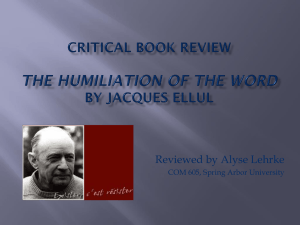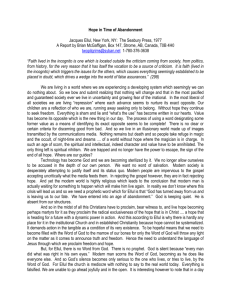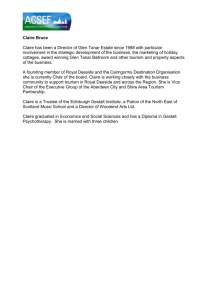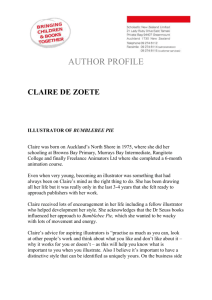Transcript of Question and Answer Session, MSc in Geographical
advertisement
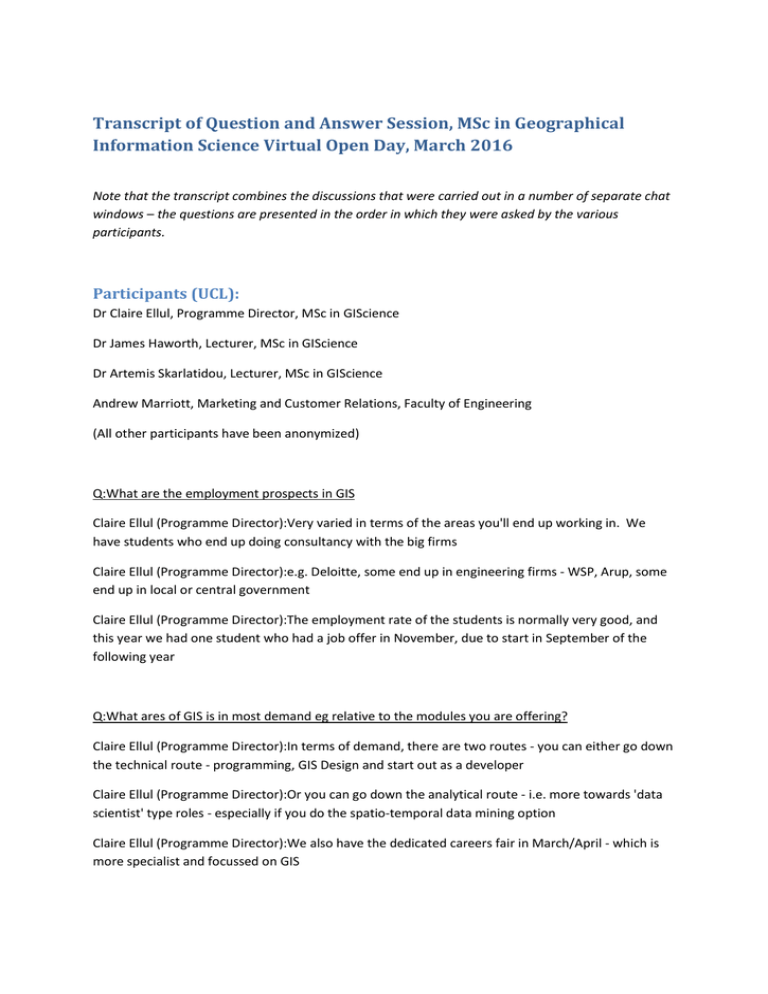
Transcript of Question and Answer Session, MSc in Geographical Information Science Virtual Open Day, March 2016 Note that the transcript combines the discussions that were carried out in a number of separate chat windows – the questions are presented in the order in which they were asked by the various participants. Participants (UCL): Dr Claire Ellul, Programme Director, MSc in GIScience Dr James Haworth, Lecturer, MSc in GIScience Dr Artemis Skarlatidou, Lecturer, MSc in GIScience Andrew Marriott, Marketing and Customer Relations, Faculty of Engineering (All other participants have been anonymized) Q:What are the employment prospects in GIS Claire Ellul (Programme Director):Very varied in terms of the areas you'll end up working in. We have students who end up doing consultancy with the big firms Claire Ellul (Programme Director):e.g. Deloitte, some end up in engineering firms - WSP, Arup, some end up in local or central government Claire Ellul (Programme Director):The employment rate of the students is normally very good, and this year we had one student who had a job offer in November, due to start in September of the following year Q:What ares of GIS is in most demand eg relative to the modules you are offering? Claire Ellul (Programme Director):In terms of demand, there are two routes - you can either go down the technical route - programming, GIS Design and start out as a developer Claire Ellul (Programme Director):Or you can go down the analytical route - i.e. more towards 'data scientist' type roles - especially if you do the spatio-temporal data mining option Claire Ellul (Programme Director):We also have the dedicated careers fair in March/April - which is more specialist and focussed on GIS Claire Ellul (Programme Director):And our seminars each week from industry also give you careers advice Andrew Marriott:joining UCL Engineering, you will have access to a dedicated team of careers advisers Andrew Marriott:http://www.engineering.ucl.ac.uk/careers-support/ Q:Does all coursework contribute to the overall mark at the end of the year? Claire Ellul (Programme Director):Each module is assessed separately and you get an overall grade (including the dissertation) at the end of the year -your overall grade will be pass, merit or distinction Claire Ellul (Programme Director):In terms of coursework, most of it is assignment based - the only exam is Mapping Science Q:Is there is research assistant job?and what I should do, contact a Professor or?? Claire Ellul (Programme Director):While you are a student there isn't the opportunity to do any research assistants role, as it is a one year full time MSc Claire Ellul (Programme Director):rather than a 2-year MSc where there may be more time for that. Claire Ellul (Programme Director):PhD students may be involved in research roles, but we also have dedicated staff as research assistants Q:what about scholarships?? does the department have an internal scholarship? or partnership with universities ?? Claire Ellul (Programme Director):The best place to find out about scholarships is on the UCL website - there are some general ones you can apply for. If you are based in the UK there is also the possibility of having a research loan, for overseas students you often get a scholarship for your own country Andrew Marriott:http://www.ucl.ac.uk/prospective-students/scholarships Q:Hi, I'm interested in programming, will we be able to build GIS databases it self or just making Applications that depend on the exsistsed GIS databases? Claire Ellul (Programme Director):You will be able to build a GIS database yourself .. but this is not done via programming as we use existing database software - PostGIS - for that Claire Ellul (Programme Director):But you can build Apps from scratch for Android phones on the web and mobile module Q:what about the programming of database software? Claire Ellul (Programme Director):Do you mean using SQL? We do extensive teaching on SQL in the Databases module, both standard SQL and also spatial SQL (which you won't get on any other SQL course) Claire Ellul (Programme Director):So the idea is that you can write SQL in the database and make the database behave like a GIS. For the assignment you will be asked to model a database from scratch, build it and run advanced sQL queries on the data that you insert Q:I have another question is that what kind of software is most frequently used?? Is it the ArcGIS or depends on personal choices?? James Haworth (Lecturer):We start with ArcGIS because it is still the most widely use software in industry, however we also teach Quantum GIS and R, as well as a number of other software that are becoming increasingly widely used in GIScience. You will get a chance to focus on what you enjoy and pick a summer project that matches up with that, Q:OK I used to learn the python to develop ArcGIS and may be more familiar with Arcgis. Therefore I wonder if I had a chance to learn new software. James Haworth (Lecturer):Generally the first term will bring everyone up to speed and you can then specialise in the second term. James Haworth (Lecturer):Does anyone have more general questions about life at UCL or in London? Andrew Marriott:For those of you who haven't seen this page yet, or wondered about life as a student in London, this is pretty good... http://www.ucl.ac.uk/prospectivestudents/graduate/life/ucl-advantage Q:I have learnt java, javascript, sql,visual basic, C++,C,html php. However I do not learn anything about R and python. Do I need to learn python and R before the learning of UCL? Claire Ellul (Programme Director):No, no need to learn anything although we will suggest a basic python course in August that you can look at online Claire Ellul (Programme Director):For those of you asking about the technical aspects of the course, remember we start from scratch with everything ... so don't worry if you don't have the skills yet Q:Re. student accommodation -what areas of London offer the most affordable student accommodation? Andrew Marriott:http://www.ucl.ac.uk/prospective-students/graduate/life/london Andrew Marriott:http://www.ucl.ac.uk/prospective-students/graduate/life/accommodation-costs Q:About the term 2, how many subjects are we needed to take ? James Haworth (Lecturer):You have 4 modules in term 2 Q:Could we learn more than 4 modules? Artemis [GIS Design/ExCiteS]:no unfortunately you cannot select more than 4 modules per term Q:what about the options of having an opportunity to upgrade to PhD?? James Haworth (Lecturer):There are quite a few cases of people staying on to do a PhD, including the three of us. James Haworth (Lecturer):Generally, it may follow on from your MSc dissertation in the summer, and there are a number of scholarship schemes within UCL to get funding. James Haworth (Lecturer):For example, in SpaceTimeLab, 3 current PhD students did the MSc in GIS before starting their PhD, and are working ion a similar topic to their summer project. Q:If we would like to upgrade to PhD, do we need to find our interesting field earlier and try to conduct certain research ? Artemis [GIS Design/ExCiteS]:this usually happens as James mentioned during your MSc dissertation Q:More details about the image processing course , please?? James Haworth (Lecturer):Please see the module guide here: https://sp.cege.ucl.ac.uk/study/Pages/Module-Guide.aspx?ModileCd=CEGEG075 Q:What about the image processing software?? Claire Ellul (Programme Director):I believe that this is Envi, but I'd have to check .. Q:What are the lasar scanning devices that are available?? Claire Ellul (Programme Director):We have one by Faro I think and another by Viametris (again I have to confirm) Q:And about the building information modelling Claire Ellul (Programme Director):On the module you will use a laser scanner and then use Autodesk tools to convert the scan into Revit where you can digitise it, and then move it into GIS Claire Ellul (Programme Director):Visualisation in Autodesk 360 Claire Ellul (Programme Director):You'll also learn all the theory behind laser scanning, the errors and standards used in industry and so forth Q:I have also got the conditional offer of Geospatial Analysis, what is the biggest difference of these two programme? Claire Ellul (Programme Director):The biggest difference is the modules on offer ... you can find the full list at http://www.uc.l.ac.uk/gis but the MSc Geospatial Analysis is in general more suited for people with an interest in environmental modelling, where as the MSc GIS will prepare you for a much wider range of GIS careers, and has a more technical focus which is in demand in industry. Q:Is there is other languages additional to python? Andrew Marriott:Depending on your module choices, you could learn a number of languages including Java, R, Python, SQL wtc. James Haworth (Lecturer):In Spatio-temporal Analysis and Data Mining you will use R statistical package and a couple of other packages, NetLogo and SatSCAN. They are all open source so check them out. Q:About image understanding, is it more about remote sensing ? James Haworth (Lecturer):Image Understanding includes advanced techniques of image understanding for the automated interpretation of range and intensity images. Imagery stems from aerial cameras, satellites, laser scanners and range sensors. Q:What is the weekly time table like? I am thinking of commuting from home (1hr30mins away) and wondering if this is possible? Claire Ellul (Programme Director):For each module, you have lectures or labs of 4 hours per week , normally spread over each 5 days Claire Ellul (Programme Director):you also have 2 hours of seminars on Thursday evenings Claire Ellul (Programme Director):having said that people do commute from that far away Q:how much knowledge of programming should I have before the study? like data structures, algorithms and programming languages? Claire Ellul (Programme Director):We do recommend that you follow a basic python course before you start - we send out details of that to anyone in August Claire Ellul (Programme Director):but we don't really assume that you are a programming or GIS expert at all .. we start from no knowledge and build it up from there
